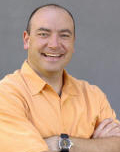
Education
Postdoctoral Fellow, Center for Conservation Biology, Stanford University
Ph.D. Population Biology, UC Los Angeles
B.S. Ecology and Evolution; Environmental Studies, UC Santa Barbara
Biography
Sean Anderson is a broadly trained ecologist who has tackled environmental questions from Alaska to the South Pole. While pursuing his Ph.D. in marine population biology at UCLA, Sean became increasingly interested in restoration ecology, eventually heading up a large salt marsh restoration effort at Mugu Lagoon in Ventura County, California. After graduate school, Sean joined Paul Ehrlich’s Center for Conservation Biology at Stanford University and began expanding his restoration and conservation work into terrestrial systems. This included everything from managing mountain lions, to assessing the economic impacts of invasive grasses, to designing museum exhibits on sustainable product design.
Sean joined the then three-year old California State University Channel Islands in 2005 as an assistant professor of Environmental Science and Resource Management. Since then, he has created a unique restoration curriculum at CSU Channel Islands. His novel approach to teaching emphasizes community service and includes a course wherein students travel to New Orleans, Louisiana to examine drivers of wetland loss and policy failures, conduct post-Hurricane Katrina (and now post-Deepwater Horizon) environmental impact assessments, rebuild homes, and install community food gardens. Sean’s energetic and innovative teaching efforts were acknowledged with the Maximus Outstanding Faculty of the Year award in 2007.
His research centers around three major areas 1) restoring degraded ecosystems, 2) improving the management of the coastal zone, and 3) the scholarship of pedagogy. His large-scale ecological restoration projects across California, Louisiana, and eastern Turkey (for which his team was awarded the 2008 Whitley Gold Award for International Conservation) usually focus on wetland or riparian systems. His coastal zone management work includes quantifying the effects of roads on mobile animals in southern California, evaluating the sustainability of seafood options available for purchase in California, and assessing the impact of pollutants on marine and estuarine systems. He created the NCEAS National Working Group on the Ecotoxicology of Gulf Oil Spill to investigate the long-term ecological consequences of the largest marine oil spill in U.S. history. Most recently he is spearheading a new consortium for the use of Remotely Piloted Systems (UAVs & ROVs) to improve the management of coastal systems.
Sean is an elected or appointed member of several working groups, boards, and joint power authorities, including the Ventura County Resource Conservation District, Santa Monica Mountains Conservancy Advisory Committee, California’s Sustainable Seafood Initiative Panel, and the Council on Ocean Affairs, Science and Technology. When not teaching or conducting research, Sean fails to help his wife clean the house and builds ever more complex LEGO landscapes with his son.
Representative Courses Taught
- ESRM 313 Conservation Biology
- ESRM 462 Coastal and Marine Resource Management
- ESRM 492 Service Learning in New Orleans
- ESRM 352 Theory and Practice of Ecological Restoration
- ESRM 370 Introduction to Remotely Piloted Systems (Drones)
- ESRM 499 Senior Capstone Research
Scholarship
Keywords
Ecological restoration, Conservation Biology, Fisheries, Coastal Systems, Wetlands, Grasslands, Oak Woodlands, Ecotoxicology, Seafood, Sustainability Science, ROV, UAV, drones, Road Kill, Sandy Beach, Coastal Zone, robots
